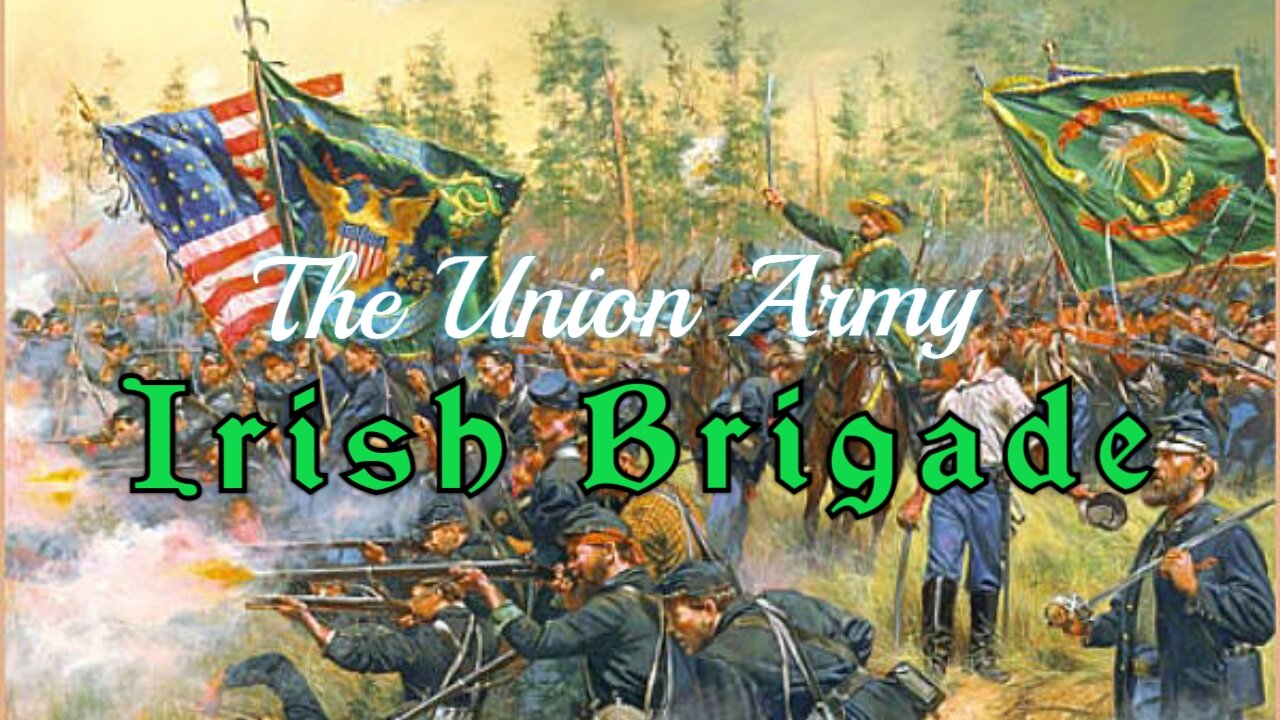Premium Only Content

The Union Army Irish Brigade
Thousands of Irish and Irish-American New Yorkers enlisted in the Union Army when the Civil War broke out in 1861. the 69th and 88th New York Infantry Regiments in the Bronx, and the 63rd New York Infantry Regiment on Staten Island. These units would become the foundation of what would become known as the Irish Brigade.
In the spring of 1862, Union Army officials added a non-Irish regiment, the 29th Massachusetts, to the Irish Brigade in order to beef up its numbers before the Peninsula Campaign for the capture of Richmond, Virginia, the capital of the Confederacy. In October, another Irish regiment, the 116th Pennsylvania Infantry Regiment from Philadelphia, joined the brigade in time for the battle at Harper’s Ferry, Virginia. The next month, officials swapped the non-Irish 29th Massachusetts Regiment for the Irish 28th Massachusetts.
Thanks to their toughness and bravery, the five-regiment Irish Brigade led the Union charge in many of the Army of the Potomac’s major battles. This meant that they suffered disproportionate numbers of casualties. At the Battle of Antietam, in September 1862, about 60 percent of the soldiers in the 63rd and 69th New York regiments, almost 600 men in all, were killed in battle. A few months later, at the Battle of Fredericksburg, 545 of the brigade’s 1,200 men were killed or wounded. “Irish blood and Irish bones cover that terrible field today,” wrote one soldier. “We are slaughtered like sheep.”
In July 1863, at the Battle of Gettysburg, about 320 of the Irish Brigade’s remaining 530 soldiers were killed.
While the Battle of Gettysburg marked the beginning of the Union's victory in the Civil War. For the Irish Brigade, it was likewise a defining moment. By the summer of 1863, many Irish soldiers and their families believed the Union Army was exploiting their readiness to fight by utilizing them as cannon fodder.
They were further enraged by the National Conscription Act, which mandated that every unmarried man in the United States between the ages of 21 and 45 be subjected to a draft lottery unless he could hire a replacement or pay a $300 fee. This was discrimination, according to many working-class Irish people: they were poor men forced to fight in a "rich man's war."
These tensions boiled over in New York City on July 13, about a week after the Battle of Gettysburg, when thousands of Irish immigrants took to the streets for five days in violent protest against the draft law
The Irish Brigade diminished greatly in size and disbanded for good in 1864.
-
 LIVE
LIVE
Dr Disrespect
1 hour ago🔴LIVE - DR DISRESPECT - WARZONE VERDANSK - SOLO WINS
1,755 watching -
 50:13
50:13
The Rubin Report
4 hours agoWill Trump’s New Escalation in Trade War with China Backfire?
52.6K11 -
 LIVE
LIVE
Canada Strong and Free Network
5 hours agoCanada Strong and Free Network
328 watching -
 LIVE
LIVE
Flyover Conservatives
11 hours agoFrom Stuck to Scaling: Clay Clark’s 5 Tips to Rapid Business Growth - Clay Clark | FOC Show
290 watching -
 LIVE
LIVE
Benny Johnson
1 hour ago🚨 Director of National Intelligence Reveals EVIDENCE of Rigged 2020 Election, Machines Switch Votes
8,793 watching -
 LIVE
LIVE
LFA TV
5 hours agoLFA TV - ALL DAY LIVE STREAM 4/11/25
3,807 watching -
 LIVE
LIVE
Side Scrollers Podcast
1 hour agoYasuke Movie Coming, BitChute SHUT DOWN in the UK, New Friday Movie & More | Side Scrollers
232 watching -
 LIVE
LIVE
Film Threat
18 hours agoTHE AMATEUR + DROP + WARFARE + LOADS OF REVIEWS! | Film Threat Livecast
109 watching -
 LIVE
LIVE
The Shannon Joy Show
2 hours ago🔥🔥PART 2: Live Exclusive With Judyth Vary Baker. She Assisted In The First Gain Of Function Research To Create A Cancer Kill Shot In 1963 And Has Something To Say About Chronic Disease …🔥🔥
163 watching -
 1:02:52
1:02:52
VINCE
4 hours agoTulsi Just Found The Classified Election Rigging Files | Episode 20 - 04/11/25
258K200